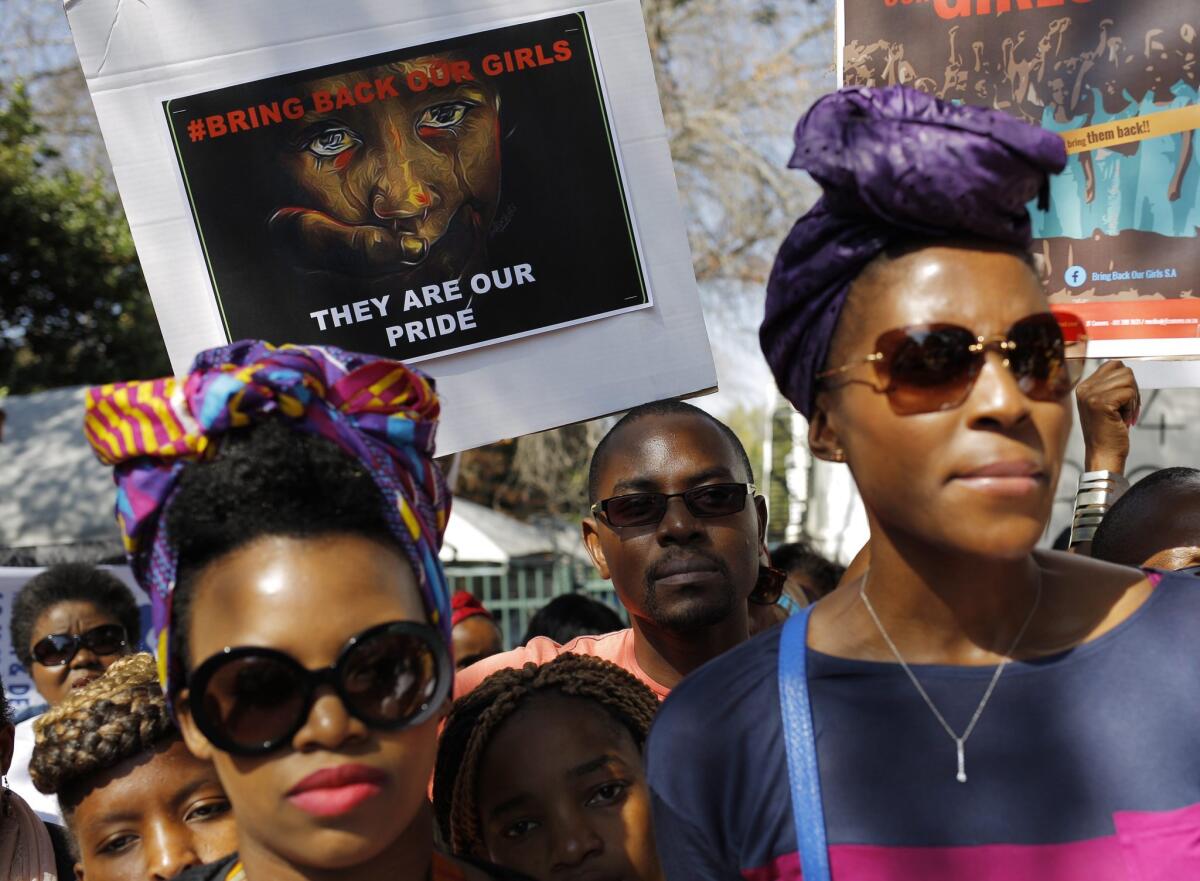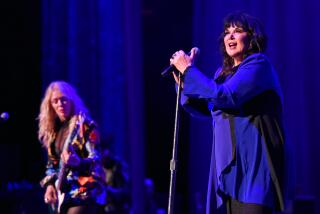Op-Ed: The heroic women of Nigeria are standing up to Boko Haram

- Share via
Weeks after the abduction of more than 300 Nigerian schoolgirls taken in a case of mass sex trafficking, the global media finally took note of the crime.
Why the shift? Because of the bravery of Nigerian women, who took to the streets to demand that the world pay attention. African women tend to be portrayed as victims — the raped, the suffering, the poor mothers of the poor girls. But across Africa, women are ending conflicts, reshaping governments and bringing attention to crucial issues. In this story, as in many others, they are the heroes.
Days after their daughters were taken, when it was clear the military would do nothing, the local women and men of Chibok, Borno state, pooled their money, bought gas for their motorcycles and bravely set out for the 30,000-square-mile Sambisa Forest, where the Boko Haram hides out. Villagers they met along the way said they had seen the girls but that pursuing them was too dangerous. When the parents tried to share what they had learned with the military, they were told to write a report.
Met with official silence, angry women across Nigeria began to raise their voices. On April 24, a coalition of Borno women’s rights groups said they were ready to mobilize thousands of women to reenter the forest to demand the girls’ release. On April 30, and on every day since then, crowds of women protested in the capital, Abuja.
On May 1, a coalition of Muslim and Christian women protested in Kaduna state. On May 2, women threatened to converge in Lagos and elsewhere, then walk en masse to Borno and enter the Sambisa Forest naked in search of the girls. On May 5, women in Ogun state protested at a solidarity rally, and the president of Nigeria’s Market Women Assn. ordered six major Lagos open-air markets closed in protest — the Lagos equivalent of the New York Stock Exchange shutting down. Those market women decided to forgo their livelihoods — some families went without meals — because what had happened in the community mattered more. Women protested in Kwara, Nasarawa and Plateau states.
Contrast these actions with those of Nigeria’s leaders, whose governance is too often based on what makes them look good to the international community. At the time the girls were taken, their focus was on sending security forces to Abuja, to make the city clean and safe for the political leaders coming to attend the World Economic Forum.
Myth and stereotype blind the world to the reality of what African women are accomplishing. In 1996, when 139 girls were taken from their Aboke, Uganda, boarding school by members of the Lord’s Resistance Army, the school’s deputy head mistress, Sister Rachele Fassera, an Italian nun, followed the rebels and was able to buy back 109 of the girls. Angelina Atyam, a mother whose daughter was not returned, became one of Uganda’s leading peace activists and made trips to the United Nations to advocate for the missing girls. Those who survived eventually reunited with their families, including Atyam’s daughter. For years, Western media had no idea what had happened.
During the worst days of the 14-year civil war in my own country, Liberia, thousands of Christian and Muslim women gathered in a field along our capital city’s main road, where we sat for months in the rain and sun, demanding peace. Women’s protests spread across the country, and when peace talks in Ghana broke down, we barricaded the conference room until they resumed. But outside Liberia, no one seemed to notice us.
As a woman and a mother, I pray for the safe return of all the abducted girls. I also applaud the strength of the women who continue to fight for them. They are African women — women who can function under the harshest conditions, who in the face of murder and rape continually stand up to fight. Strong. Resilient. Powerful. It is time for the world to put away the image of African women as victims and see them as the everyday heroes they are.
Leymah Gbowee won the 2011 Nobel Peace Prize for her work bringing peace to Liberia. She is president of the Gbowee Peace Foundation Africa. This piece was written with Carol Mithers, also coauthor of Gbowee’s memoir, “Mighty Be Our Powers.”
More to Read
A cure for the common opinion
Get thought-provoking perspectives with our weekly newsletter.
You may occasionally receive promotional content from the Los Angeles Times.









